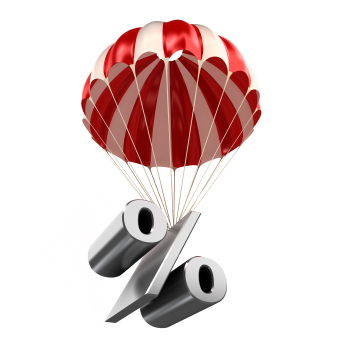 Floating Rates Getting Cheaper
Floating Rates Getting Cheaper
We’ve seen modest improvement in variable mortgage rates over the last two weeks. Nothing ground breaking—about 0.05 percentage points of extra discounting—but it’s a start.
Big banks are currently averaging prime – 0.35% if you ask nicely or negotiate, while non-banks and brokers are at least a tenth to one-quarter point cheaper.
Financial markets still anticipate one more rate cut from the Bank of Canada this year. If those traders are right, that’ll put the kibosh on further variable-rate discounts. Lenders will instead try to protect their revenue since they make less when the Bank of Canada’s overnight rate falls. They’ll do that (potentially) by reducing discounts from prime rate.
Fixed Rates Drop Too
 Since our last dispatch, it also got cheaper to lock in. The Spy now lists a remarkable seven providers with 5-year fixed rates under 2.30%. That’s seven more than the other rate comparison websites combined, none of which have sub-2.30% 5-fixed rates as of this writing.
Since our last dispatch, it also got cheaper to lock in. The Spy now lists a remarkable seven providers with 5-year fixed rates under 2.30%. That’s seven more than the other rate comparison websites combined, none of which have sub-2.30% 5-fixed rates as of this writing.
At the moment, the lowest rates are remerged for high-ratio insured mortgages. That’s because most mortgage investors prefer buying/holding low-risk government-backed loans. If you’ve got 20%+ equity, expect to pay another one-tenth of a percentage point or more (unless your mortgage was insured and you’ve held on to that insurance).
Also note: Most of these record low fixed rates are cashback effective rates. That means the provider gives you a slightly higher contract rate, plus cash back equal to the extra discount of the advertised rate.
On that note, allow us to indulge the Spy’s competitiveness for just a moment. This scrappy little website continues to lead all sources in aggregating Canada’s lowest rates. The only reason that’s possible is because—unlike other rate sites—we don’t care if a mortgage advertiser pays us. The Spy lists whoever has the best rates, as long as they’re reputable. No one here is getting rich that way, but if we’re your go-to source for mortgage deals, that’s enough to float our boat.
Ottawa’s New Budget To Pressure Rates
 If Ottawa wants Canadians to be prudent with debt, it sure isn’t leading by example. The purse string holders in our ruling party just went on a no-holds-barred spending spree, pushing Canada into a near-$30 billion debt hole.
If Ottawa wants Canadians to be prudent with debt, it sure isn’t leading by example. The purse string holders in our ruling party just went on a no-holds-barred spending spree, pushing Canada into a near-$30 billion debt hole.
Despite the budget’s economic shot in the arm, expect some serious side effects, even for the mortgage market. Instead of retiring debt, the government is now racking it up and it’ll need to issue a record number of bonds to pay for it.
What does that mean? More bond supply, which—other things equal—means lower bond prices, could in turn means higher bond yields (prices and yields moves in opposite directions).
Because lenders finance mortgages in the fixed income market, higher bond yields mean higher fixed mortgage rates. No one knows how much higher, but even a quarter point would translate into $2,300 more interest on a $200,000 5-year mortgage.
Now, this is not to say that rates will definitely go up on an absolute basis . Economic weakness could still hammer bond yields closer to 0%, and take mortgage rates down for the ride. But these monster deficits will absolutely keep rates higher than they’d otherwise be.
Is all this new federal debt worth it? Most economists are forecasting only 0.10 to 0.20 percentage points of extra growth (GDP) as a result. That’s likely insufficient to create the jobs and tax revenue needed to offset Ottawa’s mushrooming debt. But we’re a mortgage rate site and not political pundits, so that concludes our sermon on this topic.
Lenders Are Analyzing You
When you come up for renewal, lenders use data and algorithms to size you up. They try to quantify how loyal you are, how prone to rate shopping you are, how many other financial products you’ll buy from them, and how good of a rate they must offer to retain you as a customer.
Many lenders’ predictive models encourage them to offer you higher margin mortgages whenever possible, increasing their profitability and decreasing yours. (Related story)
By the way, the last thing most lenders want is for you to be on a website like this. An informed consumer is their nemesis. Your best defence against paying more is comparison shopping. Email or call the providers you see on RateSpy.com and get the lowdown on their rates, fees and services. Then check those offers against what your lender is proposing for your renewal. Here’s a mortgage checklist to help you compare deals.
And remember, if your lender is rude enough to send you a renewal letter with uncompetitive posted rates, that’s a financial kick in your groin. Don’t be loyal to a lender who’s not loyal to you.

 log in
log in
 When you come up for renewal, lenders use data and algorithms to size you up. They try to quantify how loyal you are, how prone to rate shopping you are, how many other financial products you’ll buy from them, and how good of a rate they must offer to retain you as a customer.
When you come up for renewal, lenders use data and algorithms to size you up. They try to quantify how loyal you are, how prone to rate shopping you are, how many other financial products you’ll buy from them, and how good of a rate they must offer to retain you as a customer.
2 Comments
Creep factor aside, I can understand why lenders would invest so much in analyzing their customers – they don’t want to give up more in rate negotiations than they have to. But that’s little reassurance for us clients who are often under the impression that we’re actually being offered the best rates available. To be honest it makes me feel like I’ve been had.
It still stuns me to see some of the renewal lenders that readers send us. I got one a few weeks ago that quoted a 4.64% 5-year fixed rate. It makes you wonder who is signing these letters. Are we talking about elderly people who’ve been with the bank 40+ years? Or people who don’t have a computer? Do some of these lenders have algorithms that determine whether a borrower trusts them implicitly? It boggles the mind.
By contrast, lenders who quote fair rates (and publish them on their website) deserve a round of applause. Examples include: HSBC, DUCA Financial, Marathon Mortgage, Canadiana Financial, First Ontario CU, Meridian CU, Home Trust, First National and a host of smaller credit unions, among others.